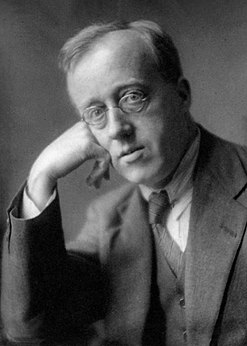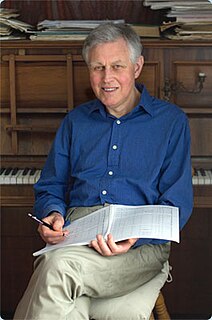Totentango is a short orchestral work by the British composer Matthew King, commissioned by the London Symphony Orchestra who premiered the work in the Barbican Hall in London in February 2010. The conductor at the first performance was Pavel Kotla. The composer has said of the work:

Matthew King is a British composer, pianist and educator. His works include opera, piano and chamber music, choral and orchestral pieces. He has been described, by Judith Weir, Master of the Queen’s Music, as “one of Britain's most adventurous composers, utterly skilled, imaginative and resourceful”.

The London Symphony Orchestra (LSO), founded in 1904, is the oldest of London's symphony orchestras. It was set up by a group of players who left Henry Wood's Queen's Hall Orchestra because of a new rule requiring players to give the orchestra their exclusive services. The LSO itself later introduced a similar rule for its members. From the outset the LSO was organised on co-operative lines, with all players sharing the profits at the end of each season. This practice continued for the orchestra's first four decades.
Ever since the mysterious "dancing plague" of 1518 there has been a long tradition of pieces of music in which dancing and death find themselves in close proximity and the orchestral repertoire is littered with totentanzes and danse macabres. Totentango is my own modest attempt to engage with that tradition. [1]
Totentango takes about 7 minutes to play. The music fuses together a plethora of dance styles in an intricate polyphony of rhythm. Tango melodies and snatches of Viennese waltz collide with habanera and techno in rapid succession as the music spirals towards obliteration. The virtuoso orchestral style contains a number of elaborate instrumental combinations whilst the lush string writing and use of muted brass is occasionally reminiscent of the film music of the 1940s. The composer Colin Matthews described the work as being "like La Valse orchestrated by Bernard Hermann". [1] Totentango embraces an almost bewildering diversity of styles and is unashamedly melodious which perhaps explains why one dissenting critic has objected to the work's being "listener friendly with a vengeance" whilst conceding that it contained "skillful scoring". [2]

In music, polyphony is one type of musical texture, where a texture is, generally speaking, the way that melodic, rhythmic, and harmonic aspects of a musical composition are combined to shape the overall sound and quality of the work. In particular, polyphony consists of two or more simultaneous lines of independent melody, as opposed to a musical texture with just one voice, monophony, or a texture with one dominant melodic voice accompanied by chords, which is called homophony.

Tango is a style of music in 2
4 or 4
4 time that originated among European immigrant populations of Argentina and Uruguay. It is traditionally played on a solo guitar, guitar duo, or an ensemble, known as the orquesta típica, which includes at least two violins, flute, piano, double bass, and at least two bandoneóns. Sometimes guitars and a clarinet join the ensemble. Tango may be purely instrumental or may include a vocalist. Tango music and dance have become popular throughout the world.
Techno is a form of electronic dance music that emerged in Detroit, Michigan, in the United States during the mid-to-late 1980s. The first recorded use of the word techno in reference to a specific genre of music was in 1988. Many styles of techno now exist, but Detroit techno is seen as the foundation upon which a number of sub-genres have been built.









